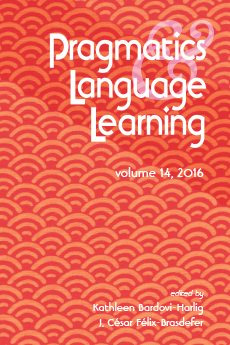This volume contains a selection of papers presented at the 2014 International Conference of Pragmatics and Language Learning at Indiana University. It includes fourteen papers on a variety of topics, with a diversity of first and second languages, and a wide range of methods used to collect pragmatic data in L2 and FL settings. This volume is divided into three main sections: Acquisition of Second-Language Pragmatics, Research in Pedagogical Contexts, and Brief Summaries and Reports. The articles advance our understanding of second language pragmatics with regard to learning and the use of pragmalinguistic resources necessary to produce and comprehend speech acts, conventional expressions, discourse markers, relational talk to develop L2 symbolic competence, and polite expressions in language textbooks.
Contents
Introduction
Kathleen Bardovi-Harlig & J. César Félix-Brasdefer
Offering Advice: Length of Residence or Intensity of Interaction?
Elizabeth Flores-Salgado
Semantic and Pragmatic Causal Relations in Native Speaker and L2 Learner Oral Discourse: The Use of the Spanish Connective Porque
Sarah E. Blackwell & Margaret Lubbers Quesada
Perceptions of Spanish L2 Writing Quality: The Role of Discourse Markers and Sentence-level Phenomena
Mai Kuha, Lisa M. Kurisack, & Elizabeth M. Riddle
The Interactional Establishment of the Membership Category ‘Nonnative Speaker’ in Gatekeeping Encounters
Jouise Tranekjær & Katherine Kappa
Effects of Metapragmatic Instruction on the Production of Compliments and Compliment Responses: Learner-Learner Role-plays in the Foreign Language Classroom
Marie Hasler-Barker
Challenges Facing Mexican EFL Learners: Disagreement and local pragmatic practices
Gerrard Mugford
Playful Performances of Russianness and L2 Symbolic Competence
Maria Shardakova
Do EFL Teachers in Serbia Have What They Need to Teach L2 Pragmatics? Novice Teachers’ Views of Politeness
Milica Savić
Noticing of Pragmatic Features During Spoken Interaction
Tetyana Sydorenko & Gwen Heller Tuason
“Always remember to say please and thank you”: Teaching Politeness with German EFL Textbooks
Holger Limberg
A Research-based Teaching Unit for ESL/EFL Students Responses to Gratitude
Sara Gesuato
How Formulaic is Pragmatics?
Kathleen Bardovi-Harlig
The Design and Construction of Websites to Promote L2 Pragmatics
Andrew D. Cohen
A Corpus Linguistic Analysis of On-line Peer Commentary
Naoko Taguchi, David Kaufer, María Pía Gómez-Laich, & Helen Zhao

